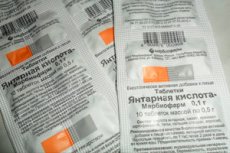Medical expert of the article
New publications
Preparations
Amber acid in pregnancy: can you drink, how to take?
Last reviewed: 04.07.2025

All iLive content is medically reviewed or fact checked to ensure as much factual accuracy as possible.
We have strict sourcing guidelines and only link to reputable media sites, academic research institutions and, whenever possible, medically peer reviewed studies. Note that the numbers in parentheses ([1], [2], etc.) are clickable links to these studies.
If you feel that any of our content is inaccurate, out-of-date, or otherwise questionable, please select it and press Ctrl + Enter.

Succinic acid is white crystals with a salty-bitter taste. It is used mainly in plant growing, as it promotes plant growth and increases their yield. In addition, it is used in the chemical and food industries (marked on product packaging as additive E363). Succinic acid is inexpensive and FDA-approved, making it an attractive therapeutic agent. [ 1 ], [ 2 ], [ 3 ]
In medicinal preparations, succinic acid acts as a metabolic agent, improving metabolism and saturating tissues with oxygen. That is why it is recommended during pregnancy.
Indications of succinic acid in pregnancy
Succinic acid is a biologically active additive (BAA) and is designed to stimulate human life processes and support the immune system. Indications for its use are:
- regeneration of tissues and organ cells;
- anxiolytic effect; [ 4 ]
- removal of toxins; [ 5 ]
- increased blood supply in vessels and capillaries;
- stimulation of the nervous system, has a protective effect in central and peripheral neuropathy; [ 6 ]
- increase in hemoglobin levels in the blood; [ 7 ]
- normalization of the genitourinary system;
- elimination of intoxication in cases of alcohol and other poisoning;
- reducing the harmful effects of antibiotics;
- prevention of oncological diseases;
- increasing mental and physical capabilities;
- improving the course of pregnancy;
- stimulation of fetal growth and development.
Succinic acid is also recommended when planning pregnancy, as it improves reproductive function, eliminates inflammatory processes, increases susceptibility to infections, and reduces the risk of toxicosis.
In the same way, succinic acid is useful for men at this stage. It increases potency, helps minimize stress, removes toxins and alcohol breakdown products, increases overall tone, has a rejuvenating effect on organs and systems, which will have a beneficial effect on the health of the future child.
Release form
Succinic acid is sold in tablets (it is packaged and sorted differently by different manufacturers) and powders (white).
Pharmacodynamics
The main pharmacological property of succinic acid is antioxidant, the ability to bind free radicals, [ 8 ] negatively affecting the body, slow down oxidative processes. In addition, it has a metabolic, [ 9 ] antihypoxic, [ 10 ] immunomodulatory effect.
Succinic acid is effective in treating endometrial cancer cell lines, which will provide new data for other areas of cancer research. [ 11 ]
It gives the cells of the organs more energy, which makes them function better, promotes the transfer of oxygen from the blood to them, thus improving tissue respiration, increases the body's resistance to psycho-emotional, physical stress and other negative endogenous and exogenous factors.
Pharmacokinetics
The drug starts to work 20-30 minutes after taking it. When it breaks down inside a person, water and carbon dioxide are formed. It is excreted through the kidneys and stomach.
Dosing and administration
Before taking succinic acid, you need to consult a doctor. If the product is approved by a specialist, you must follow the instructions for use and dosage. Pregnant women in the first trimester (from the 12th to the 14th week) are recommended to take 2.5 g per day for 10 days, dividing into 3-4 doses. The course is repeated in the second trimester (between the 24th and 26th weeks) and before the expected birth 25-10 days. The tablets are taken immediately before meals.
Contraindications
Succinic acid has some contraindications for use. The product can be harmful in case of exacerbation of gastritis, stomach ulcer, increased acidity, individual intolerance. You should not resort to the drug in case of glaucoma, high blood pressure, kidney stones, angina, chronic insomnia.
Side effects of succinic acid in pregnancy
Succinic acid has virtually no side effects, unless contraindications are ignored. Otherwise, pain in the epigastric region may occur, blood pressure may increase, and symptoms associated with existing diagnoses may appear.
Overdose
Cases of overdose have not been officially recorded. Hypothetically, it may cause increased side effects.
Interactions with other drugs
The combined use of succinic acid with sedatives and tranquilizers weakens the effect of the latter. In other cases, it enhances the therapeutic effect of drugs.
Storage conditions
The storage location for succinic acid should be free from moisture and bright light.
Shelf life
The dietary supplement is stored for 4 years from the date of manufacture, after which it must be disposed of.
Reviews
There are mostly positive reviews about succinic acid. Young people share that it helps them cope with remembering a large amount of information, endure lack of sleep after night parties, and quickly return to normal after drinking.
It helps pregnant women in the first months of pregnancy to minimize the manifestations of hormonal changes, reduces the risk of toxicosis, and the risk of complications during labor.
Attention!
To simplify the perception of information, this instruction for use of the drug "Amber acid in pregnancy: can you drink, how to take?" translated and presented in a special form on the basis of the official instructions for medical use of the drug. Before use read the annotation that came directly to medicines.
Description provided for informational purposes and is not a guide to self-healing. The need for this drug, the purpose of the treatment regimen, methods and dose of the drug is determined solely by the attending physician. Self-medication is dangerous for your health.

